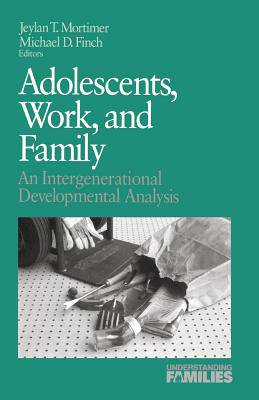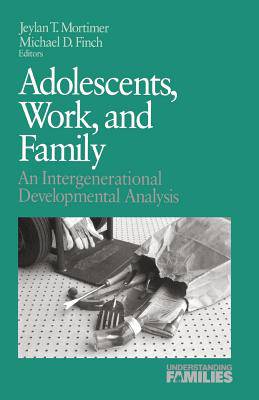
- Afhalen na 1 uur in een winkel met voorraad
- Gratis thuislevering in België vanaf € 30
- Ruim aanbod met 7 miljoen producten
- Afhalen na 1 uur in een winkel met voorraad
- Gratis thuislevering in België vanaf € 30
- Ruim aanbod met 7 miljoen producten
Zoeken
€ 177,45
+ 354 punten
Omschrijving
What does an adolescent really learn about adult responsibilities from holding down a paying job or doing household chores? Does a teenager′s employment lead to change in the family? Based on an 8-year study, Adolescents, Work, and Family examines how adolescents′ work experiences, both within the home and in the paid work force, affect their relationship with their parents, their self-concepts, and their well-being. This book is unique in that it studies not only working adolescents but their parents as well. Among their findings the contributors reveal the importance of work quality and context in developing youth competence, the similarity between parents and children in their perceptions of the benefits and costs of youth work, how paid work can contribute to positive family relationships, how positive work experiences can buffer the adolescent from stressful family problems, and how an adolescent′s work plans influence their early transition to adulthood. In addition, the book offers readers directions for future research in this growing area of inquiry. Acquiring and maintaining work is a marker of the adolescent′s transition to adulthood. Thus, scholars of adolescent and family development, youth and family policymakers, and professionals who help youths and their families will find the book′s revelations important and useful. "This book is timely and is much needed to help clarify an understanding of the impact of work on adolescents and their families. It is the first to draw together a detailed analysis of intergenerational ties to work while maintaining a focus on adolescents. Moreover, a myriad of complex issues including work and development, work as an arena of comfort, and the meaning of work for adolescents and their parents are examined over time for a representative yet situated sample. While there are competing books . . . Jeylan T. Mortimer and Michael D. Finch′s volume is really the first to provide a highly detailed analysis over time." --Kathryn M. Borman, University of South Florida
Specificaties
Betrokkenen
- Auteur(s):
- Uitgeverij:
Inhoud
- Aantal bladzijden:
- 280
- Taal:
- Engels
- Reeks:
- Reeksnummer:
- nr. 6
Eigenschappen
- Productcode (EAN):
- 9780803951259
- Verschijningsdatum:
- 1/08/1996
- Uitvoering:
- Paperback
- Formaat:
- Trade paperback (VS)
- Afmetingen:
- 153 mm x 227 mm
- Gewicht:
- 453 g

Alleen bij Standaard Boekhandel
+ 354 punten op je klantenkaart van Standaard Boekhandel
Beoordelingen
We publiceren alleen reviews die voldoen aan de voorwaarden voor reviews. Bekijk onze voorwaarden voor reviews.








